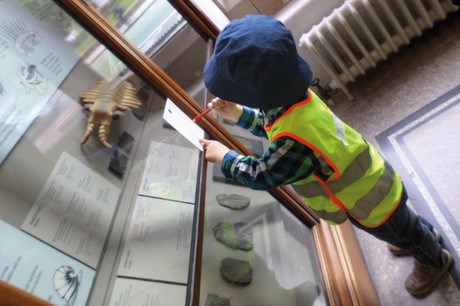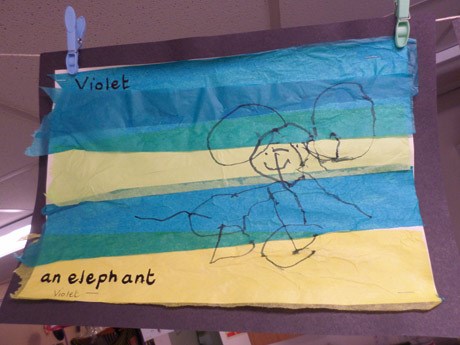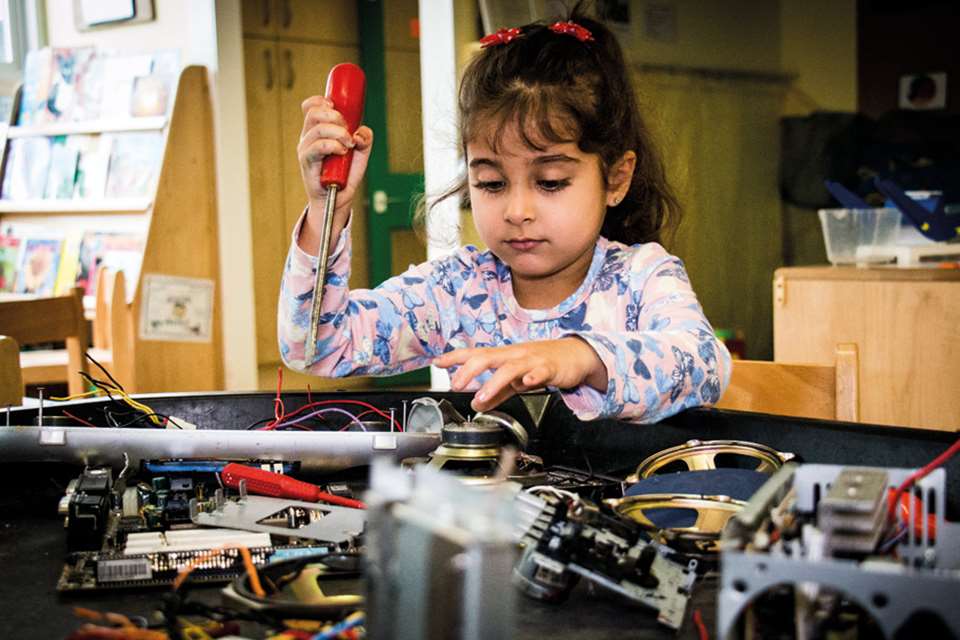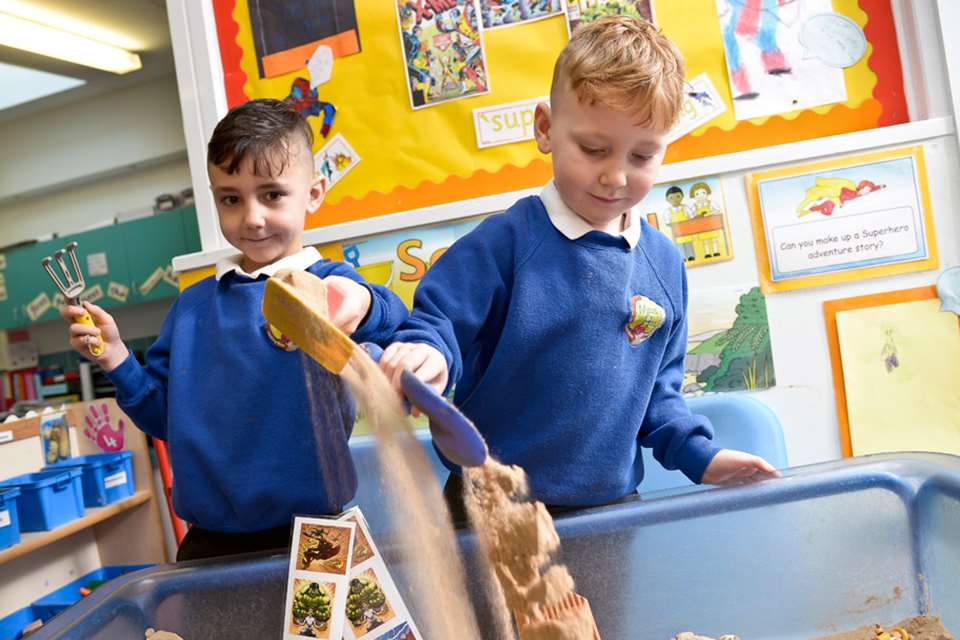Enabling Environments: National Teaching Schools - Rich rewards
Annette Rawstrone
Monday, July 11, 2016
The deputy head at a nursery school in Manchester with NTS status tells Annette Rawstrone about its collaborative working ethos, which has benefited the children, their families and staff alike

Collaboration is key to enabling Martenscroft Nursery School and Children’s Centre, a small setting based in Hulme, Manchester, to have a big impact. ‘Collaborative working is not always easy but the benefits are huge,’ says deputy head teacher Lisa Taylor. ‘Our collaborative work, whether that involves creativity, family work, working with training partners or research, all works to enrich the outcomes for our children and families.’ Staff at the 60-place setting also benefit from collaboration by having the opportunity to widen their professional experience.
The ethos of collaborative working is evident from the way that Martenscroft’s different elements – nursery class, childcare provision, children’s centre and teaching school – are fully integrated. The inner-city nursery was awarded National Teaching School (NTS) status in February 2015 (see box) and Ms Taylor says the embedded culture of staff working closely together was crucial to its success.
‘Staff are contracted to the nursery school and children’s centre as a whole so that they do not just work with over-threes, for example. We have a small staff team and couldn’t become a NTS without collaborative working,’ she says. ‘Staff are our greatest resource. We expect a lot from them but also give a lot back such as greater responsibility and a career structure.’
The collaborative approach means that children can be placed according to their need. For example, if a child has a nursery class place but requires a different type of support they could be placed in a different space in consultation with their family. ‘This can be challenging with different constraints but children’s needs are at the heart of all our provision,’ says Ms Taylor.
Staff meet regularly to discuss all the children. ‘We don’t have one person who is a family support worker because we feel it’s the duty of everyone, not separate. If we all discuss and support the families then we gain a wider and more rounded understanding,’ says Ms Taylor. ‘It also enables us to get to people who need help earlier. It’s all about getting the right support at the right time and using people’s different skills.’
CREATIVE COLLABORATION
Along with internal collaboration, staff at Martenscroft have forged links with other organisations, including a number of arts bodies. They are working with Manchester Museum, Live Music Now and Z-arts to jointly develop creative approaches to learning and for the children to benefit from a wider range of expertise.
‘In the past, people would visit the nursery for arts and creative projects as a one-off but now, because we are collaborating, it is really built into the system, week after week, and the children truly benefit from the sustained input,’ says Ms Taylor.
It would have been easy to be daunted by the organisation of taking 60 children to the museum, but staff ‘pared it back’ and thought about it. ‘We’ve found it more effective to have a more targeted approach and focus on groups of six to ten children depending on their need or ability with a minimum of four visits to the museum,’ Ms Taylor says. For example, staff may choose to work with a group of children who are working at a higher level so that they can challenge their critical thinking, or those with English as an additional language who may have a low baseline of speaking or listening.
The first visit to the museum is often very exciting as the children explore; on the second visit staff can start to see children’s interests and what they’re drawn to and this can be consolidated on the follow-up visits.
‘The children will often return to nursery full of confidence and with the self-esteem to share their knowledge,’ says Ms Taylor. ‘Every group is so different – one was interested in technology and recorded what they saw on iPads and dictaphones, another was more drawn to the physicality of things and explored through dance and movement.’
Staff try to provide many opportunities for parents to become informed and involved in their children’s learning. ‘We aim to directly collaborate with parents, such as by inviting them along when we go on visits or getting them to come into the nursery to share their children’s work. We also hold evening sessions for those parents who work as well as celebration and community events such as a recent international day,’ says Ms Taylor.
Through participating in research on two-year-olds’ experience of museums they found out that some of their parents did not take their children to museums because of misunderstandings. Common barriers were that they thought that they would have to pay, that they needed an appointment, or that museums were not child-friendly places – and also that they would need to be quiet.
‘By asking parents to join us on the museum visits we’ve found it gives them the confidence to do similar trips with their children,’ Ms Taylor says. ‘We also see that they start to collaborate with the other parents in the group as they see each other each week. This helps to build a support network of parents within the community. They can help to educate others.

OUTSIDE LINKS
Staff at Martenscroft share their expertise with other early years settings through partnerships with two not-for-profit training companies – the Parental Engagement Network (PEN) and Quality 4 Early Years.
‘It’s important to build collaborations with other agencies as it is the only way to sustain change,’ says Ms Taylor. ‘We see ourselves as providing the practical element to the training because practitioners want to see theory in action. So the time they spend with us is focused on specific areas, such as early reading, and then they get the theory to back it up.’
When choosing these partnerships, Ms Taylor says that they ensured there was a shared ethos. She cautions, ‘Issues can arise even with a collaborative vision when working with a variety of partners so it’s important to have a memorandum of understanding and to have regular meetings to review this.’
Staff are contributing to developing a range of training materials to engage disadvantaged parents alongside PEN and are also involved in research with Manchester Metropolitan University (MMU), whose education and social care site is across the road from Martenscroft. They are currently involved in the 2curious project, exploring how research and practice interlink with an emphasis on working in new ways with two-year-olds.
‘It’s important that research impacts on children and practitioners. It’s easy to get lost in the work but you have to bring it back to the main thing that we’re here for and that’s the children,’ Ms Taylor explains. ‘Collaborating with MMU is great for staff professional development. Many never expected they would be part of university life and now they are contributing to research papers. We have different experiences and views, they are the people engaging in direct work and the ones that are having a direct impact on the children.’
The university collaboration has led to staff feeling empowered to conduct their own research, such as investigating how the snack area is used and how it can be improved.
Ms Taylor sees Martenscroft as working as a learning community. ‘We don’t have all the answers but we’re learning together. Our attitude is that it’s a two-way thing and where we don’t have the answers others will have,’ she explains.
‘Staff here tend to stay and we could settle in our ways but that’s not how you retain Outstanding. To keep being Outstanding you have to always be looking forwards and outwards. Our collaborations are good for staff professional development, they keep us sharing reflective practice and, above all, they help us with our vision for the children and their families, which is to work together to provide the best for them and their community.’
MORE INFORMATION
Manchester Museum, www.museum.manchester.ac.uk
www.martenscroftnurseryschool.co.uk
Parental Engagement Network, http://penetwork.co.uk
For more on the NTS programme, www.gov.uk/government/collections/teaching-schools-and-system-leadership-how-you-can-get-involved

TEACH MANCHESTER
Martenscroft is part of a wider teaching school alliance consisting of Piper Hill Special School, Loreto College and St Mary’s Primary School Moss Side, known collectively as Teach Manchester. Its aim is to raise standards in their own settings and support others to do the same.
‘Our support is driven by our passion for developing lifelong learning, a belief in the importance of developing quality in the early years and a belief in training for practitioners by practitioners,’ says deputy head teacher Lisa Taylor.
By collaborating with other schools across the education spectrum, staff can work with the other partners on projects and look at the impact from nursery to high school. ‘There are shared elements of understanding and practice and it’s great to be able to see impact through the ages,’ adds Ms Taylor.









